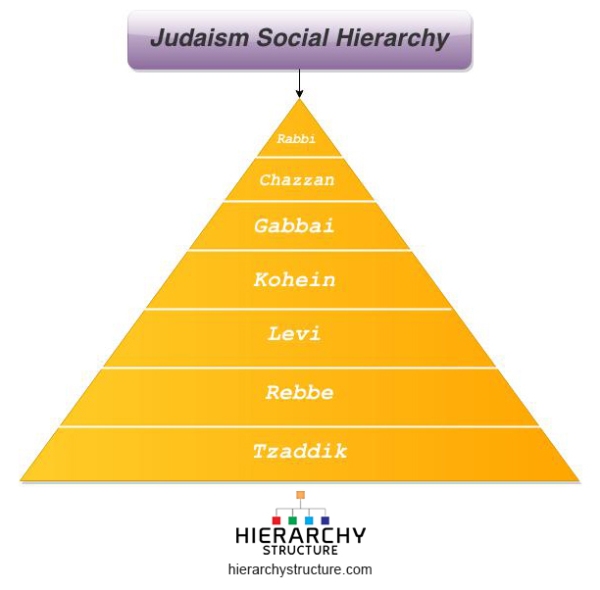Based on the history of centuries, it is evident that the Judaism is an autonomous religion which can sustain under any circumstance. The foundation of Judaism relies on the original covenant established between God and Abraham when he was called to proceed to the promised land of Cannon.
Judaism is not based on a hierarchical structure in the real sense, though there are several special designations given to people, who perform their designated services in the community. Given below are the special roles played by people in the social hierarchy of Judaism:
 Rabbi
Rabbi
In the Jewish community every adult male can perform the religious rituals and there is no concept of a priest who is authoritative to perform rituals. A Rabbi is a teacher who is qualified in Jewish law and customs, who can teach the community, clarify their doubts and resolve disputes among them as per the law. A rabbi’s role can be compared to the position of a protestant minister, who is supporting the community, leading the religious rituals and engaging with organisational matters associated with the synagogue.
Chazzan
A Chazzan (Cantor) is the man who leads the congregation prayers and the melodious music in the service. Any male adult person with anunderstanding of the prayers and services can lead these and sometimes the rabbi take over the role of chazzan in small congregations. However, professional chazzans are hired in larger congregations, who are proficient in music and services and can teach young people about the same.
Gabbai
A gabbai is generally a common man who offers to perform several duties in association with the Torah readings in the prayer services. A gabbai is supposed to be well versed with Torah readings and attending as a gabbai is considered as a great honour in the Jewish community.
Kohein
A Kohanim is another honourable position in Jewish community who are given the first Aliyah on Shabbat. At certain other special occasions in the community, a kohanim is asked to recite a sanctification over the community. However, followed by the demolition of the temple, the significance of kohanim is lowered in favour of the rabbis.
Levi
Similar to the Kohanims, the Levis also became less significant after the obliteration of the temple. The Levites are asked to perform some special rituals related to the temple and they are eligible for the horror of second Aliyah on Shabbat.
Rebbe
The position of a Rebbe is hereditary and the literal meaning of the term is ‘My Rabbi’. A Rebbe is considered as a spiritual master and a leader of the Chasidic community, who has the decisive final word over public decisions. A Rebbe is sometimes considered as a Tzaddik in the Jewish community.
Tzaddik
The literal meaning of the word Tzaddik is the ‘righteous one’ and it refers to an absolutely righteous person in the community, who usually possesses some mystical or spiritual power. It is not compulsory that a tzaddik to be a ‘rebbe’ or ’rabbi’, but a ‘rebbe’ in the Chasidic community is considered as a tzaddik.
Know about Jewish Church Hierarchy.
